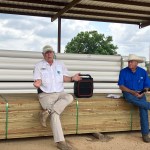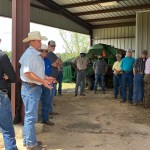Cattleman’s Association tours local cattle farms
Published 4:38 pm Monday, May 5, 2025



MOULTRIE – The Colquitt County Cattlemen’s Association hosted a cattle tour Thursday.
The group of about 40 loaded up on a tour bus and visited four cattle farms in the county, including Windy Pond Farm, Powell Cattle Farm, Baker Cattle Farm and Fenco Farms.
The tour was led by Harry Thompson, former vice president of the Georgia Cattlemen’s Association Region 14. A representative or owner, at three of the farms, spoke about their operation and the types of cattle they were raising.
Tony Lasseter, owner of Windy Pond Farm, said: “The pure breed business is a real tough business to be in.”
He said that what they’ve been doing the last four or five years is taking purebred Angus cows and purebred Hereford cows and crossbreeding them to make Black Baldy cows, which are also called Black Whiteface.
“And somewhere along the way, we’ll make some purebred Herefords and some purebred Angus,” Lasseter added.
Lasseter said that he’s been raising heifers for years and has always wanted to raise bulls.
“But it takes something special to raise bulls. Heifers are easy to raise but bulls get to be kind of aggravating. They’ll tear-up everything,” he said.
He said they DNA test every cow that’s on the farm and if it’s a heifer that doesn’t meet his criteria, they send it to the stockyards.
“And the reason is I don’t want to wait 2 1/2 years to find out that heifer’s not gonna raise a calf,” he said. “It costs just as much to feed a sorry one as it does a good one.”
Lasseter said the DNA test looks for 17 different traits including the docility, milk, rib-eye, the marbling and the hot carcass, which is the weight immediately after slaughter and evisceration but before it’s been chilled.
“The purebred business is fine. I used to have purebred cows. … It’s hard for me to sell a purebred cow,” he said. “I started swapping them over and I can sell them Black Baldys.”
He added that anybody will buy the Black Baldy cows and they’ll pay good money for them.
“And at the end of the day, I don’t care what you do, most cows sell by the pound. … It’s putting pounds on the ground is what you want,” Lasseter said.
He also said that, as he understood it, the cow numbers were at the lowest they’ve been since the 1950s. Then, he said that he didn’t understand how a commercial cowman could pay $3,000 – $4,000 for a commercial heifer and make it work. The two categories of beef cattle operations are purebred and commercial.
Lasseter said that he had talked to a man in the industry who was very knowledgeable about it.“I asked him a question, I said, ‘How long do you think this is going to go on?’ And he said, ‘Well, I know it’s gonna last three more years. I don’t know how much longer it’s gonna last after that.’ … The numbers are the lowest they’ve ever been cause people are getting rid of them. … For different reasons,” he said.
He said some people were getting rid of cows because they were trying to pay off a debt and he said he knew people who sold off their whole herd because they thought it was the “last hurrah.” They wanted to get their money, now, because they didn’t want to worry about what was coming.
“I mean people are cashing in,” he said. “We may not ever see this again, may not never see it. I don’t know.”
He said that he didn’t know what was going to happen but all he could tell them was that, now, the cow business was as good as he’s ever seen in his life.
Lasseter also told the group that he honestly loved working with cattle.
At Powell Cattle Farm, Jeff Powell spoke to the group and he told them that he’s been in the cattle business for about 20 years, but only in the purebred business for about six or seven of those. At the Powell farm, they breed Angus cows.
He also introduced his wife, Kay, and his son Harrison.
“Trying to get to 100% purebred,” Powell said, “I have some older cows that are commercial. That’s the cattle that we’re predominately doing ET (embryo transfer) work in. We’ve got a spring group and a fall group.”
He said they usually run about two rounds of the embryos and also one or two rounds of artificial insemination, depending on what he had going on as this was not his full-time job.
Powell works at Helena Chemical.
“Moving towards pretty much 100% AI (artificial insemination) on the AI side of things and just have minimal bulls to clean-up is my goal. … But with it just being me and Harrison, when he can, it’s just hard to catch all the right heats at the right time,” he said.
Powell also said that he consigns some of his bulls to Deer Valley Farm in Fayetteville, Tennessee. They also have a spring sale and two fall sales during the year, he said.
“Most all of my genetics come from Deer Valley. I have bought some heifers and some young cows from Kevin Yon. But the vast majority of them come from Deer Valley,” he said.
He said that in the purebred business, it changes so fast in genetics, especially, on the female side of things. He also said he has aligned himself with a group of ranchers across the country and he follows their protocols.
“There’s probably half a dozen guys that I follow my programs by — try to model myself by them,” Powell said.
He said he didn’t know any cattlemen who were satisfied with his group of cattle even when someone complimented him. Because they think it still isn’t good enough, he said.
“You see holes in your program. You just try to fill in those holes,” he said.
Powell said he tries to work his programs so that he has a market everywhere he goes.
“It’s a lot to keep going on but I enjoy it,” he said.
At Fenco Farms, which is based in Florida, Clay Cooper, the general manager of the location in Colquitt County, spoke to the group.
“We’ve been headquartered out of Floral City, Florida and we have slowly been migrating in y’all’s direction. So we appreciate y’all taking the time to come visit with us today and let us tell you a little bit about our operation and our expansion up this way,” he said.
Cooper said they had predominantly been in the cow/calf business and now have migrated a little bit into the registered brand business, as well.
“So we’ve got a bull sale in October and we’ve got registered female sales and we’ll also be incorporating some commercial female components to those sales, as well,” he said.
Cooper added that they were trying to diversify in their offerings within the industry. In Floral City, he said, was where they managed all of their registered cattle. There were six different locations about 45 minutes from the headquarters, he said.
“Our cow/calves, we go ahead and strip those calves in September. They go out to a backgrounding yard in Paxico, Kansas with Michael Hurla, who backgrounds for us, and then, from there, they migrate over to High Plains and finish all of our cattle out and, then, they go to the grid on national,” Cooper said.
He said that they have been at the Peacock Ranch, in Colquitt County, for several years. Also, they have just acquired a piece of land in Rebecca and up around Ashburn. He said they would be bringing commercial cattle into those locations and continuing their expansion.
“The way we operate our cattle, we operate our commercial the same way as we’re gonna run our registered,” Cooper said. “We believe, if we’re offering a genetic to other commercial cattlemen that they need to be able to go out and work and they need to hold together and they need to be able to provide a profit for our commercial cattlemen and our customers.”
Back in 2014, he said the company started collecting DNA samples from their commercial cattle and heifers. Everything has an electronic identification tag.
“So, what that allows us to do on our commercial side and how we can tie it back to our registered side is we use a lot of our bulls that we’re developing each year, in our seed stock business, to support our commercial business, as well,” Cooper explained.
He said they’ve been pretty progressive on what they do with data collection and have put together a good staff.
“We’ve been pretty fortunate to be able to come up this way,” Cooper said. “We’re steadily looking for ways to evolve in the industry and to continue growing our operation and try to have a little bit of fun while doing it.”








